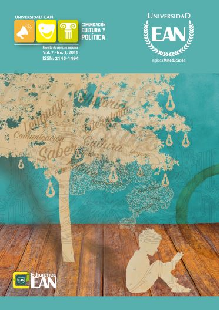The bakhtinian concepts of ideology and dialogue as input to promote the development of ideas in academic literacy processes
The bakhtinian concepts of ideology and dialogue as input to promote the development of ideas in academic literacy processes
Contenido principal del artículo
Resumen
This theoretical essay works around the changing place of reading and writing, not only in the learning environments but in the society. It brings into consideration the development of ideas as an extremelly important resource when it comes to presenting reading and writing in these contexts. Such development can arise when Bakhtin's concepts around ideology (system of ideas) and dialogue become the guiding principles of any pedagogy that is interested in reading and writing processes.
This text addresses the different ideologies of the writing processes (traditional, cognitive expressivist, and socio-epistemic), and it concludes that the socio-epistemic posture expressed through the pedagogy of the writing genres responds better to the concepts of ideology and dialogue, being this one the most solvent to assume processes of reading and writing concerned with the development of ideas.
Detalles del artículo
Referencias (VER)
Bakhtin, M. M. (1981). Discourse in the novel. In M. Holquist (Ed.), The dialogic imagination: Four essays by M.M. Bakhtin (C. Emerson, & M. Holquist, Trans.). Austin, TX: University of Texas Press.
Bartholomae, D. (1986). Inventing the University. Journal of Basic Writing. 5, 1, p.4-23.
Carlino, P. (2005). Escribir, leer y aprender en la universidad. Una introducción a la alfabetización académica. Buenos Aires: Fondo de Cultura Económica.
Centro Nacional de Memoria Histórica. (2016, February 25). Retrieved from http://www.centrodememoriahistorica.gov.co/
Freedman, S. W., & Ball, A. F. (Eds.). (2004). Ideological Becoming: Bakhtinian concepts to guide the study of language, literacy, and learning. In A. F. Ball & S. W. Freedman (Eds.), Bakhtinian perspectives on language, literacy, and learning, 3-33. New York: Cambridge University Press.
Gee, J. P. (2004). New Times and New Literacies: Themes for a changing world. In A. F. Ball & S. W. Freedman (Eds.), Bakhtinian perspectives on language, literacy, and learning. New York: Cambridge University Press.
Hyland, K. (2004). Genre and Second Language Writing. In D. Belcher & J. Liu (Eds.), Michigan Series on Teaching Multilingual Writers. Ann Arbor, MI: The University of Michigan Press.
Johns, A. (1997). Text, role and context: Developing academic literacies. In M. H. Long & J. C. Richards (Eds.). Cambridge: Cambridge Applied Linguistics.
Lindemann, E. (2001). A Rhetoric for Writing Teachers (4th Ed.). Oxford: Oxford University Press.
Mahiri, J. (2004). New Teachers for New Times: The Dialogical Principle in Teaching and Learning Electronically. In A. F. Ball & S. W. Freedman (Eds.), Bakhtinian perspectives on language, literacy, and learning, p.213-231. New York: Cambridge University Press. 17
Morson, G. S. (2004). The process of ideological becoming. In A. F. Ball & S. W. Freedman (Eds.), Bakhtinian perspectives on language, literacy, and learning, p. 317-331. New York: Cambridge University Press.
Pérez, M., & Rincón, G. (2013). ¿Para qué se lee y se escribe en la universidad colombiana? Un aporte a la consolidación de la cultura académica del país (1ra ed.). Bogotá: Editorial Pontificia Universidad Javeriana.
Descargas
Datos de publicación
Declaraciones de autoría
- Sociedad académica
- Universidad Ean
- Editorial
- Universidad Ean




